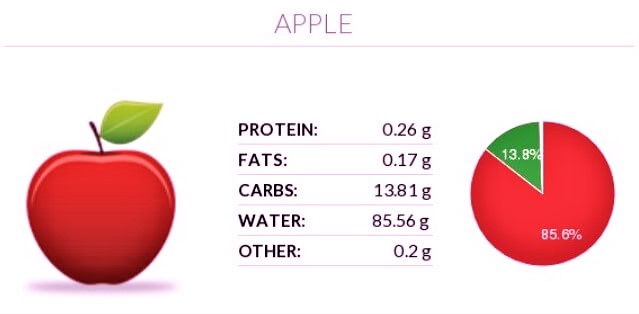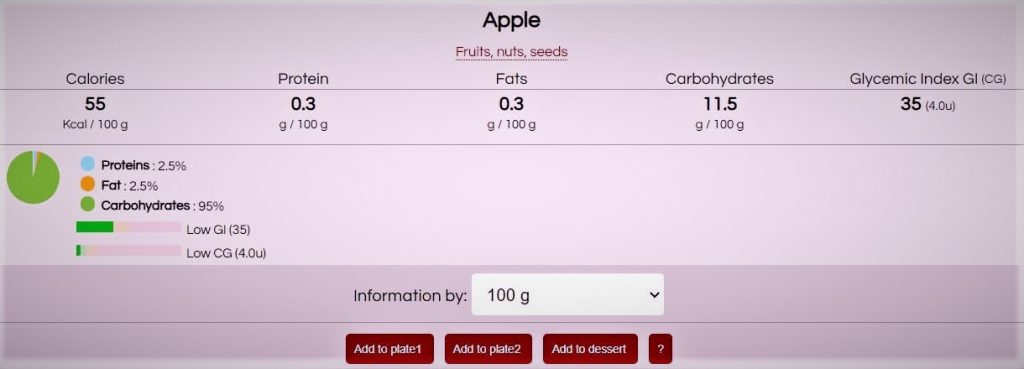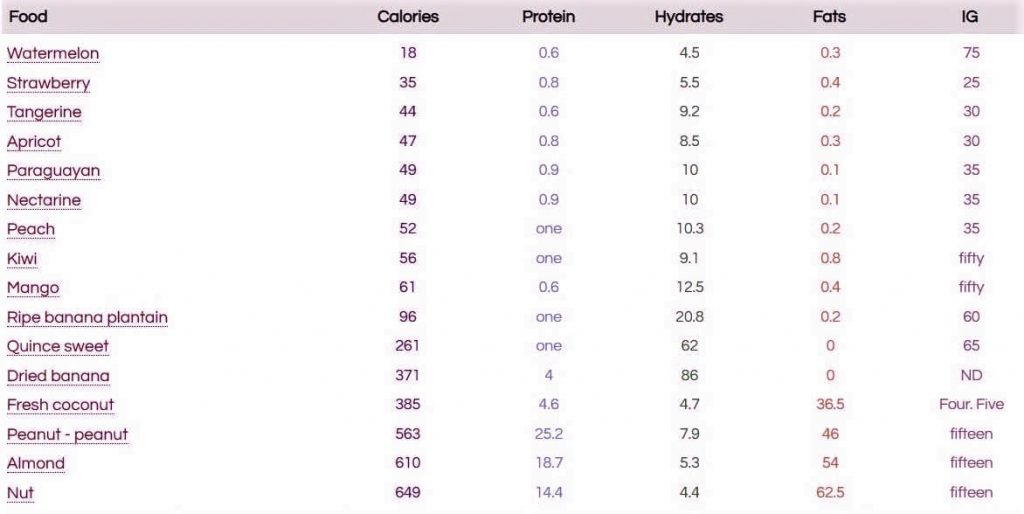apple protein:The apple is one of the most complete and healthy fruits that are known for its content of carbohydrates, fiber, vitamins and potassium, being highly recommended for all ages. An English aphorism says that ” an apple a day keeps the doctor at a distance “.
The apple is the fruit of the apple tree (Pyrus malus L.), a tree of the Rosaceae family, to which other fruits such as peach, apricot, plum and cherry also belong, to name a few examples. Although the exact origin of the apple is unknown, it is believed to have come from the crossing of several species of European and Asian wild apple trees. What can be assured is that man, from ancient times, learned to cultivate the apple tree and, currently, it is one of the most widespread fruit trees in the world .

Fruits are always associated with the vitamins and minerals that they provide us with and are necessary for the proper functioning of the body. We hardly ever name them when talking about proteins , although they do contain some amounts. It is true that they are not too high, but for that reason we should not ignore them. On this occasion we are going to present you four different types of fruits so that you can guess which of them is the one that contains the most amount of protein .
First of all we are going to talk about the apple protein, a basic fruit in the diet of all of us, since it contains high doses of fiber that helps us purify the body. Along with this, it must be borne in mind that it is a low calorie food, so its intake is recommended in any weight loss diet. Against this we must also highlight its vitamin contribution, specifically vitamin A, E, B1 and B2.
Read also:are apples good for constipation
Apple types
There are more than a thousand varieties of apples around the world. There are apples of all colors and for all tastes: red, yellow, green, crunchy, sweet, aromatic, sour … Some of the most popular varieties in Spanish markets are:
- Golden delicious : American variety widely cultivated throughout the world. It is a medium to large apple . Its skin is golden yellow, sometimes with pink areas, with small black spots , called lenticels, which facilitate the respiration of the fruit. Its pulp is juicy, fine, sweet, aromatic and slightly acidic. It is delicious raw, or for baking. Depending on its degree of maturity, it is crunchy or tangy or, on the contrary, sweet and soft meat. It can be found on the market from September until the end of August of the following year.
- Granny Smith : Australian variety, it stands out for its intense green color with some white dots. Its pulp is white, very crunchy and juicy, with a slightly acid flavor . It is a late variety, which is harvested between October and November and can be found until May of the following year.
- Canada gray pippin : it is a French variety of large size and flattened shape. Its skin is thick, oxidized yellow or a golden-white-gray color, and its cream-white pulp is juicy, aromatic, sweet with a slight acid point. It can be found in the markets between November and March. In Spain, the Reineta del Bierzo apple has enjoyed a Denomination of Origin for years.
- Red Starking : it is one of the best known varieties. Originally from the United States, it is a mutation from the Red Delicious variety. It has a red, shiny skin, with red and greenish streaks, and a crisp, yellowish white pulp, with a sweet, very smooth flavor . It is in the markets from September to June.
- Royal Gala: Originally from New Zealand, this variety has a skin with red and orange stripes on a greenish yellow background. Its pulp is white, crisp and consistent, very aromatic and juicy . It is collected from the end of August to December.
Apple protein nutrients

From a nutritional point of view, the apple is a very complete fruit . Its low caloric intake (an average apple contains about 80 kcal) joins its richness in certain nutrients:
- Water . 85% of its composition is water , making it a very refreshing and hydrating fruit.
- Carbohydrates . Mainly in the form of fructose and, to a lesser extent, glucose and sucrose, which are easily absorbed by the body.
- Proteins and Fat . In small quantities, not very important with respect to its content in other nutrients.
- Vitamins . It contains small amounts of vitamin E or tocopherol and vitamin C , with antioxidant action. The vitamin C content differs according to the variety, being the pippin the ones that contain the most vitamin C (11 mg), followed by the Granny Smith (7.3 mg), the Golden (5 mg) and the red varieties (3.6 mg). On the other hand, the B vitamins are also present, which promote nervous functions.
- Minerals . The presence of potassium stands out, necessary for the transmission and generation of the nerve impulse and for muscular activity, and which, at the same time, favors kidney function. It also contains small amounts of zinc, manganese, sulfur, fluorine, iodine, boron or selenium, which play important roles in the processes that take place in the cell.
- Fiber . The apple is rich in fiber, it is estimated that an apple provides about 3 grams of fiber. This fiber is not only in its skin, but also in its pulp, and it is mainly composed of cellulose and pectin, which have an interesting action on the regulation of intestinal transit . These fibers are effective in stimulating a lazy intestine and in helping to fight diarrhea.
- In addition, the apple is rich in flavonoids , such as quercetin, with antioxidant properties, and in tannins , with astringent and anti-inflammatory capacity, as well as in organic acids such as malic and tartaric acid.
Properties of apple for health

Ideal as a mid-morning or mid-afternoon snack, the apple is one of the healthiest fruits known and, as such, one of the most recommended to include in the diet. Natural remedies, transmitted from generation to generation, qualify it as ideal in case of pulmonary affections, mixed with a spoonful of honey to cut the cough, for oral hygiene of the gums, in case of physical and intellectual exhaustion, in case of gout , as an excellent antidiarrheal … How do apples help us ?:
To appease anxiety . When you cannot concentrate because you have an empty stomach, it is advisable to take an apple, since it only contributes 50 Kcal per 100 grams. This will avoid other more caloric foods, such as potato chips, pastries, chocolate or sweets, and that are unhealthy, since, among other things, they provide more calories that are going to be stored as fat.
As a natural toothpaste . The fibers of the apple (pink parts of both the skin and the pulp), combined with the force of chewing, have a dragging and cleaning effect on food residues in the mouth , as well as strengthening the gums. As it is an aromatic fruit, it also works against bad breath.
In the fight against cholesterol . The apple contains a fiber, pectin, which is ideal for reducing cholesterol that is ingested with the diet. It drags it before it is absorbed by the body. It is the perfect fruit to complement a meat or egg dish. Its fiber is also purifying on an empty stomach because it reduces the cholesterol in the bile.
To improve memory. The apple provides us with vitamins B1 and B6 , which prevent mental exhaustion and strengthen memory. It is also a source of phosphorus, a mineral present in the phospholipids of the brain, potassium and sodium, essential for nerve conduction.
To strengthen hair and nails . The apple provides iron, essential for strong hair and nails . It also contains pantothenic acid or vitamin B5, which is a promoter of hair regrowth.
Against obesity . Fresh fruit, juices or a low-calorie whole-grain biscuit should be the complement food that satisfies the excessive appetite of young people, due to the few kilocalories they provide, if we do not want them to walk towards being overweight and obese. Of course, all this complemented with the practice of some sport on a regular basis.
As a reinforcement for defenses. The vitamin C contained in the apple stimulates the immune cells, strengthening the defenses and preventing us from colds and flu.
As an ally against hemorrhages. Its vitamin C strengthens the walls of the blood vessels and helps in wound healing, by stimulating the formation of collagen. It also prevents spontaneous nose and gum bleeding.
As an antidote to decay . The apple is the fruit with the highest fructose content that exists. This sugar is a monosaccharide, which is a simple molecule for immediate use by the body, which takes us out of a drop in glucose in the blood, avoiding the typical fatigue and dizziness that can appear between one meal and another.
As a growth aid . The apple is a source of calcium and phosphorus , essential in the formation of mineral salts in bone. It also provides vitamin C, which is involved in the formation of the matrix substance of the bone. On the other hand, the B vitamins are necessary for the growth and development of muscles. For all this it is good to take apples when it is in the growing season.

To increase muscle capacity. The vitamin B1 or thiamine prevents muscle fatigue, while vitamin B2 helps in energy production and vitamin B6 is involved in the proteins that form muscle mass.
To rest the eyes . When our eyes become dry due to poorly ventilated places, heating, computer use or simply wearing contact lenses for a long time, apples provide water with vitamin B2 that hydrates them and improves the vision mechanism. The apple is especially suitable when using contact lenses.
Against acne . To avoid acne it is necessary to have a hydrated and purified skin; in this sense, the apple is a good source of water (85%). In the same way, since it does not contain fat or refined sugars, it does not contribute to causing it.
As an isotonic drink . The cells of the body must have an adequate level of hydration, since the human body is made up of 70% water. The kidneys filter 2.5 liters of water daily, which must be replaced with 1.5 liters of pure water and another from food. The apple is 85% water and contains dissolved vitamins, minerals and sugars; therefore, this fruit quenches thirst and maintains the water level in all cells of the body. In addition, it is easy to transport and can be taken at any time of the day.
As an intestinal regulator . The apple contains in its pulp substances called pectins that effectively regulate intestinal transit . Due to their ability to swell with water, they facilitate peristalsis, without interfering with the absorption of calcium, iron or magnesium, but blocking the passage of cholesterol to the cells of the intestinal surface. When you want to use to avoid constipation you should eat the apple with the peel. On the other hand, to avoid diarrhea it should be consumed without the peel, and it is more advisable to take it grated.
Against the harmful effects of pollution and tobacco. The fumes from pollution and tobacco oxidize the body’s cells. The amount of vitamin C provided by the apple has an antioxidant effect on tissues, preventing premature aging.
[fcp-protein-intake-calculator]

